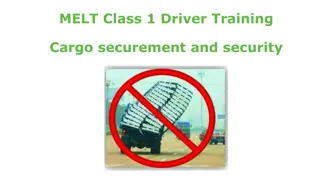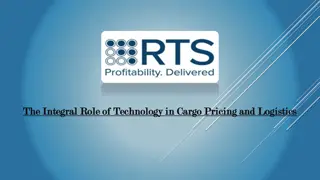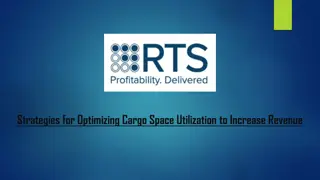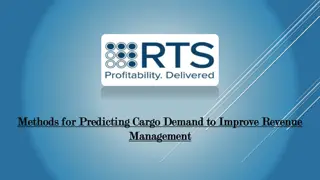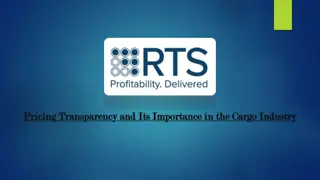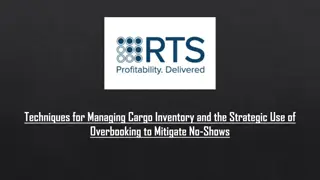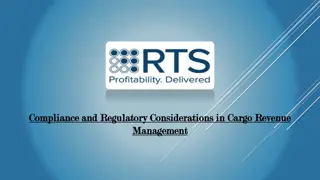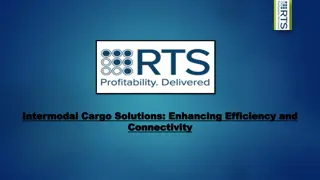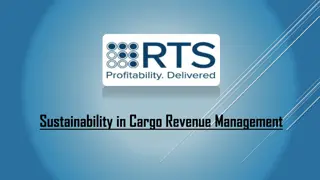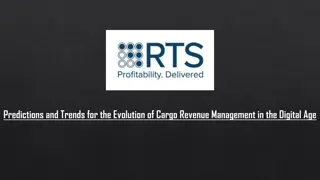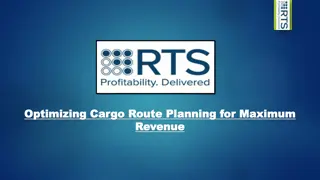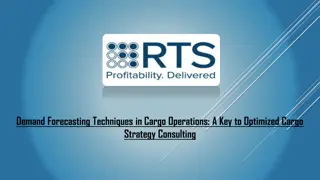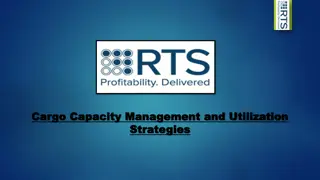Real-Time Decision Making in Cargo Operations
In the dynamic world of cargo operations, the ability to make real-time decisions is critical. The ever-changing variables of supply and demand, route availability, and market competition require immediate adjustments to maintain profitability and efficiency. Revenue Technology Services (RTS) stands at the forefront of this revolution, leveraging real-time data to enhance cargo revenue management (CRM).n
- cargo cloud solutions
- cargo pricing
- cargo revenue
- cargo revenue management
- cargo solutions
- cargo strategy consulting
Download Presentation

Please find below an Image/Link to download the presentation.
The content on the website is provided AS IS for your information and personal use only. It may not be sold, licensed, or shared on other websites without obtaining consent from the author. Download presentation by click this link. If you encounter any issues during the download, it is possible that the publisher has removed the file from their server.
E N D
Presentation Transcript
In the dynamic world of cargo operations, the ability to make real-time decisions is critical. The ever-changing variables of supply and demand, route availability, and market competition require immediate adjustments to maintain profitability and efficiency. Revenue Technology Services (RTS) stands at the forefront of this revolution, leveraging real-time data to enhance cargo revenue management (CRM).
The Importance of Real-Time Data Real-time data is a game-changer in cargo operations. Unlike traditional methods that rely on historical data and periodic updates, real-time data provides an up-to-the-minute snapshot of current conditions. This immediacy enables cargo operators to respond swiftly to changes, such as fluctuating fuel prices, unexpected route changes, and sudden shifts in demand. By integrating real-time data into their CRM systems, companies can make informed decisions that optimize pricing and operational efficiency. Dynamic Pricing Strategies One of the most significant applications of real-time data in cargo operations is dynamic pricing. Traditional static pricing models are often inflexible and unable to respond to market fluctuations. In contrast, dynamic pricing uses real-time data to adjust prices based on current demand, competition, and available capacity. This approach ensures that cargo operators can maximize revenue by capitalizing on high-demand periods and offering competitive rates during low-demand times. Revenue Technology Services utilizes advanced algorithms to analyze real-time data and implement dynamic pricing strategies. By continuously monitoring market conditions and adjusting prices accordingly, RTS helps cargo operators stay competitive and profitable. This method not only increases revenue but also enhances customer satisfaction by providing fair and timely pricing.
Operational Efficiency Beyond pricing, real-time data plays a crucial role in enhancing operational efficiency. Cargo operations involve complex logistics, including route planning, load optimization, and resource allocation. Real-time data allows for immediate adjustments to these operations, ensuring that resources are used efficiently and delays are minimized. For instance, real-time tracking of cargo shipments enables operators to reroute shipments in response to traffic congestion, weather disruptions, or other unforeseen events. This capability reduces delays and ensures that cargo reaches its destination on time. Additionally, real-time data can help optimize load planning by providing insights into current capacity and demand, allowing operators to maximize the use of available space and reduce the number of empty or underutilized shipments. Enhanced Decision Making Real-time decision making supported by accurate and timely data is the cornerstone of effective cargo revenue management. Revenue Technology Services empowers cargo operators with the tools and insights needed to make these decisions. By integrating real-time data into their CRM systems, RTS provides a comprehensive view of the operational landscape, enabling operators to anticipate changes and respond proactively. Moreover, real-time data facilitates better communication and coordination among different departments within a cargo operation. For example, sales teams can use real-time pricing information to negotiate better deals, while logistics teams can adjust routes and schedules based on current conditions. This integrated approach ensures that all parts of the operation are aligned and working towards the common goal of maximizing revenue and efficiency.
Conclusion In the fast-paced world of cargo operations, real-time decision making is not just an advantage it is a necessity. By leveraging real-time data, Revenue Technology Services enhances cargo revenue management through dynamic pricing and operational efficiency. This approach ensures that cargo operators can respond swiftly to changing conditions, maximize revenue, and provide superior service to their customers. As the industry continues to evolve, the integration of real-time data into CRM systems will remain a critical factor in driving success and competitiveness.









